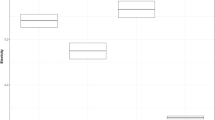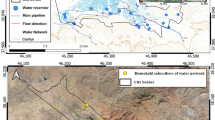Abstract
Studies evaluating the determinants of water demand typically use household-scale data or aggregated data. The household-scale data basically is preferred since it can reveal the heterogeneity in responses to the demand drivers across different consumer groups. However, the scarcity of household-scale data and its high data collection cost generally have limited the studies to rely on small samples of household data. Thus, they failed to show the spatial variation of water demand. In contrast, the aggregated studies have assessed the spatial variation of water use however they overlooked the variations across households. Using a rich source of GIS-based urban databases in Auckland, New Zealand, this study overcame this challenge by developing a large sample of 31000 single-unit housing through integration of household-level water consumption and property data with micro-scale household demographics information. This large dataset enabled this study to evaluate the water consumption both at the household scale and the census area unit scale. Panel data models were used for the water demand analysis in both scales. The proposed multi-scale analysis approach provided detailed knowledge about water consumption and its major determinants across different consumer groups and urban areas. This information may help water planners to more reliably plan water supply systems and manage consumption in the complex urban environments.


Similar content being viewed by others
References
Abrams B, Kumaradevan S, Sarafidis V, Spaninks F (2012) An econometric assessment of pricing Sydney's residential water use. Econ Rec 88:89–105
Al-Zahrani MA, Abo-Monasar A (2015) Urban residential water demand prediction based on artificial neural networks and time series models. Water Resour Manag 29:3651–3662. doi:10.1007/s11269-015-1021-z
Arbués F, Barberán R, Villanúa I (2004) Price impact on urban residential water demand: a dynamic panel data approach. Water Resour Res 40:W1140201–W1140209
Arbués F, García-Valiñas MA, Martínez-Espiñeira R (2003) Estimation of residential water demand: a state-of-the-art review. J Socio-Econ 32:81–102
Arbués F, Villanúa I, Barberán R (2010) Household size and residential water demand: an empirical approach. Aust J Agric Resour Econ 54:61–80
Ashoori N, Dzombak DA, Small MJ (2016) Modeling the effects of conservation, demographics, price, and climate on urban water demand in Los Angeles, California. Water Resour Manag 30:5247–5262. doi:10.1007/s11269-016-1483-7
Auckland-Council (2015) Property information http://www.aucklandcouncil.govt.nz/EN/ratesbuildingproperty/propertyinformation/GIS_maps/Pages/Home.aspx. Accessed Nov 2015
Babel MS, Gupta AD, Pradhan P (2007) A multivariate econometric approach for domestic water demand modeling: an application to Kathmandu, Nepal. Water Resour Manag 21:573–589
Balling RC Jr, Gober P, Jones N (2008) Sensitivity of residential water consumption to variations in climate: an intraurban analysis of phoenix, Arizona. Water Resour Res 44:1–11. doi:10.1029/2007WR006722
Bathrellos GD, Gaki-Papanastassiou K, Skilodimou HD, Papanastassiou D, Chousianitis KG (2012) Potential suitability for urban planning and industry development using natural hazard maps and geological-geomorphological parameters. Environ Earth Sci 66:537–548. doi:10.1007/s12665-011-1263-x
Bathrellos GD, Gaki-Papanastassiou K, Skilodimou HD, Skianis GA, Chousianitis KG (2013) Assessment of rural community and agricultural development using geomorphological-geological factors and GIS in the Trikala prefecture (Central Greece). Stoch Env Res Risk A 27:573–588. doi:10.1007/s00477-012-0602-0
Bathrellos GD, Karymbalis E, Skilodimou HD, Gaki-Papanastassiou K, Baltas EA (2016) Urban flood hazard assessment in the basin of Athens Metropolitan city, Greece. Environ Earth Sci 75:319. doi:10.1007/s12665-015-5157-1
Chang H, Parandvash G, Shandas V (2010) Spatial variations of single-family residential water consumption in Portland, Oregon. Urban Geogr 31:953–972
CliFlo (2015) New Zealand's national climate database. The National Institute of Water and Atmospheric Research. http://cliflo.niwa.co.nz/. Accessed Nov 2015
Domene E, Saurí D (2006) Urbanisation and water consumption: influencing factors in the metropolitan region of Barcelona. Urban Stud 43:1605–1623
Dziedzic R, Margerm K, Evenson J, Karney BW (2015) Building an integrated water-land use database for defining benchmarks, conservation targets, and user clusters. J Water Resour Plan Manag 141:1–9. doi:10.1061/(asce)wr.1943-5452.0000462
Everitt BS, Landau S, Leese M, Stahl D (2011) Cluster analysis, 5th edn. Wiley, West Sussex
Fenrick SA, Getachew L (2012) Estimation of the effects of price and billing frequency on household water demand using a panel of Wisconsin municipalities. Appl Econ Lett 19:1373–1380
Fox C, McIntosh BS, Jeffrey P (2009) Classifying households for water demand forecasting using physical property characteristics. Land Use Policy 26:558–568
Ghavidelfar S, Shamseldin AY, Melville BW (2016a) Estimation of the effects of price on apartment water demand using cointegration and error correction techniques. Appl Econ 48:461–470. doi:10.1080/00036846.2015.1083082
Ghavidelfar S, Shamseldin AY, Melville BW (2016b) Future implications of urban intensification on residential water demand. J Environ Plan Manag:1–16. doi:10.1080/09640568.2016.1257976
Ghavidelfar S, Shamseldin AY, Melville BW (2016c) A multi-scale analysis of low-rise apartment water demand through integration of water consumption, land use, and demographic data. J Am Water Resour Assoc 52:1056–1067. doi:10.1111/1752-1688.12430
Goodyear R, Fabian A (2014) Housing in Auckland: trends in housing from the census of population and dwellings 1991 to 2013. Available from http://www.stats.govt.nz/
Hill RC, Griffiths WE, Lim GC (2010) Principles of econometrics, 4th edn. John Wiley & Sons, New York
Hoffmann M, Worthington A, Higgs H (2006) Urban water demand with fixed volumetric charging in a large municipality: the case of Brisbane, Australia. Aust J Agric Resour Econ 50:347–359
Höglund L (1999) Household demand for water in Sweden with implications of a potential tax on water use. Water Resour Res 35:3853–3863. doi:10.1029/1999wr900219
House-Peters LA, Chang H (2011) Urban water demand modeling: review of concepts, methods, and organizing principles. Water Resour Res 47:1–15
House-Peters L, Pratt B, Chang H (2010) Effects of urban spatial structure, sociodemographics, and climate on residential water consumption in hillsboro, oregon1. J Am Water Resour Assoc 46:461–472
Jorgensen B, Graymore M, O'Toole K (2009) Household water use behavior: an integrated model. J Environ Manag 91:227–236. doi:10.1016/j.jenvman.2009.08.009
Kenney DS, Goemans C, Klein R, Lowrey J, Reidy K (2008) Residential water demand management: lessons from Aurora, Colorado. J Am Water Resour Assoc 44:192–207
Kenney DS, Klein RA, Clark MP (2004) Use and effectiveness of municipal water restrictions during drought in Colorado. J Am Water Resour Assoc 40:77–87
LINZ (2015) LINZ data service http://www.linz.govt.nz/about-linz/linz-data-service. Accessed Nov 2015
Martinez-Espiñeira R (2002) Residential water demand in the Northwest of Spain. Environ Resour Econ 21:161–187
Mieno T, Braden JB (2011) Residential demand for water in the chicago metropolitan area. J Am Water Resour Assoc 47:713–723
Nauges C, Thomas A (2000) Privately operated water utilities, municipal price negotiation, and estimation of residential water demand: the case of France. Land Econ 76:68–85
Ouyang Y, Wentz EA, Ruddell BL, Harlan SL (2014) A multi-scale analysis of single-family residential water use in the phoenix metropolitan area. J Am Water Resour Assoc 50:448–467
Panagopoulos GP, Bathrellos GD, Skilodimou HD, Martsouka FA (2012) Mapping urban water demands using multi-criteria analysis and GIS. Water Resour Manag 26:1347–1363
Pint EM (1999) Household responses to increased water rates during the California drought. Land Econ 75:246–266
Polebitski AS, Palmer RN (2010) Seasonal residential water demand forecasting for census tracts. J Water Resour Plan Manag 136:27–36
Russac DAV, Rushton KR, Simpson RJ (1991) Insights into domestic demand from a metering trial. J Inst Water Environ Manage 5:342–351
Schleich J, Hillenbrand T (2009) Determinants of residential water demand in Germany. Ecol Econ 68:1756–1769
Shandas V, Parandvash GH (2010) Integrating urban form and demographics in water-demand management: an empirical case study of Portland, Oregon. Environ Plann B Plann Des 37:112–128
Statistics-NZ ( 2015) Statistics New Zealand http://www.stats.govt.nz/. Accessed 15 Nov 2015
Syme GJ, Shao Q, Po M, Campbell E (2004) Predicting and understanding home garden water use. Landsc Urban Plan 68:121–128
Troy P, Holloway D (2004) The use of residential water consumption as an urban planning tool: a pilot study in Adelaide. J Environ Plan Manag 47:97–114. doi:10.1080/0964056042000189826
Verbeek M (2004) A guide to modern econometrics, 2nd edn. John Wiley & Sons, West Sussex
Weber JA (1989) Forecasting demand and measuring price elasticity. J Am Water Works Assoc 81:57–65. doi:10.2307/41292540
Wentz EA, Gober P (2007) Determinants of small-area water consumption for the City of Phoenix, Arizona. Water Resour Manag 21:1849–1863
Worthington AC, Hoffman M (2008) An empirical survey of residential water demand modelling. J Econ Surv 22:842–871
Acknowledgements
The funding of this research was provided by the Watercare Services Limited. Access to the census data used in this study was provided by Statistics New Zealand under conditions designed to give effect to the security and confidentiality provisions of the Statistics Act 1975. The results presented in this study are the work of the authors, not Statistics NZ.
Author information
Authors and Affiliations
Corresponding author
Rights and permissions
About this article
Cite this article
Ghavidelfar, S., Shamseldin, A.Y. & Melville, B.W. A Multi-Scale Analysis of Single-Unit Housing Water Demand Through Integration of Water Consumption, Land Use and Demographic Data. Water Resour Manage 31, 2173–2186 (2017). https://doi.org/10.1007/s11269-017-1635-4
Received:
Accepted:
Published:
Issue Date:
DOI: https://doi.org/10.1007/s11269-017-1635-4




